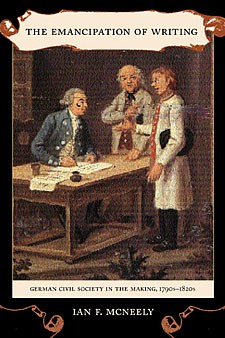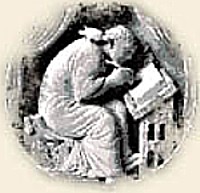Essay (back
to top)
Summary of Ian McNeely’s Emancipation of Writing
The Emancipation of Writing is an erudite work that was the result of extensive research in the archives of Württemberg by the author, Ian McNeely. Splitting his book into two parts, McNeely separates pre-Napoleonic Germany from the post-Napoleonic period. He analyzes how the changes imposed by the French monarch affected the ways in which state and society interacted. He poses a very complex and detailed argument suggesting that the emergence of a civil society in south Germany’s Württemberg state was not merely a top down process, but one in which the lower strata of society played a significant role. An important role was played by writing, an art which was monopolized by the scribes and the overly bureaucratic system of government. The introduction of press, as well as the changes to the old regime that occurred after Napoleon, are all topics of lengthy discussion in this work.
The emergence of a civil society in Wurttemberg began before the arrival of Napoleon, and was, according to McNeely, largely the result of the interaction between state and society. Correspondence between the people and their government was regulated by an excessively formal system that was highly dependent on writing to function. This link between state and society, McNeely explains, was embodied in the scribes, individuals elected by the citizens of each canton who performed a myriad of tasks. Each scribe was involved in everything from compiling estate inventories to taking minutes at town meetings to managing the town’s finances and even mediating in property disputes among the townspeople. The scribe was, as McNeely puts it, “at once his town’s notary, its archivist, its clerk, its secretary, its accountant, its court reporter, and its legal advisor” (28). The scribes occupied a unique position in society, being mediators between the people in their canton and the government. With their position came power and influence. They held a monopoly over information about their town, its people, and their government, and had the ability to influence politics indirectly but effectively, being ‘political ventriloquists’ in McNeely’s terms. Some scribes were influenced by Enlightenment ideals that began to seep into Wurttemberg after the French Revolution. They used their position of power for political activism, utilizing collegiality among scribes to unite people against their government.
McNeely describes in detail the Black Forest Cahier and the Waiblingen petition, two impressive but thwarted attempts at reform. After Napoleon’s invasion, McNeely explains, Württemberg’s boundaries were redrawn, making it significantly bigger, and the duchy struggled to function under its ineffective, overly formal bureaucratic system. To remedy the situation, the job of the scribes was divided into multiple positions and their hold over information was broken. The introduction of press also made information available to the masses, letting them purchase printed information on an open market instead of going through the quasi governmental scribes. As enlightenment thinking spread throughout Germany, both the state and society hungered for more information, resulting in the widespread publication of almanacs and intelligence gazettes. Though still not completely free of governmental control, news was now available to everyone, and information began to circulate throughout the state. People were able to buy and sell information, and they became ever more connected to others in their state, completing the emancipation of writing, and the emergence of a civil society in the state of Württemberg.
Developing Civil Society in Wüttemberg:
Cahiers, Petitions, and Print
In The Emancipation of Writing, Ian McNeely argues that the creation of a civil society in Germany’s Württemberg state was not purely a top-down phenomenon, but one in which the lowest levels of society played an important role. He attempts to refute a previously unchallenged understanding that a civil society was mainly the result of Enlightenment ideals being embraced by the highest levels of society, and passed on through laws and constitutional changes to the lower classes. McNeely backs up his argument by focusing on two events in which the lower classes united against the government and demanded reform. The Black Forest Cahier and the Waiblingen petition are both examples, according to McNeely, of a burgeoning civil society in Germany. Both these events, however, were mediated and motivated by scribes, governmental employees, and therefore do not take place outside the sphere of governmental influence. The introduction of print into Württemberg, and reforms imposed from above were far more influential in creating a civil society in Germany than the lowest levels of society.
The Black Forest Cahier
In order to know when and how a civil society emerged in Germany, it is necessary to define the term. McNeely defines it as “the realm where citizens interact independently of the state” (3), but the definition proposed by Hegel also includes the ability of individuals to “freely associate and freely pursue their economic interests” (Melton). McNeely claims that the lower classes played an important role in the emergence of such a society, and claims that the Black Forest Cahier was one of the first important steps in the process. “The Black Forest Cahier spearheaded the most ambitious campaign to reform the duchy’s political system between the Tübingen Compact and the Napoleonic wars” (68). The cahier, a listing of problems the people had with their government, was passed among towns, and eventually came to exhibit the grievances of an entire region. This attempt to reform the government was headed by scribes and showcased their collegial system through which they were able to unite in protest against the government. Though the attempt failed, McNeely claims it was an important event for revealing the wide collegial systems scribes had established. He argues that, though scribes were government officials, their exchange across cantons is a precursor to even more developed interactions that would fall under the heading of a civil society. “As often as not, scribes corresponded among themselves rather than through central parliamentary officials. They relayed messages from canton to canton, adding their own observations and commentaries along the way….[T]his sharing of perspectives helped districts mobilize against excessive fiscal exactions and develop a unified front on what could be extremely divisive matters” (75). Though scribes talked amongst themselves outside official channels does not change the fact that they were themselves government officials. The Black Forest Cahier, then, cannot be seen as a forerunner to civil society because it did not take place outside the governmental sphere. Instead of showing that civil society developed from below, the Black Forest Cahier shows more involvement from government officials, backing the top-down development of civil society in Württemberg.
The Waiblingen Petition
The next event that McNeely highlights as proof of lower class involvement in the creation of a civil society in Germany is the Waiblingen petition of 1805. In protest against Duke Friedrich’s retraction of the Tübingen Compact, the petition shows an involvement of the townspeople as well as the scribes. Though it too failed in its attempts at reform, it did exhibit unity among the people:
Whereas the Cahier relied on elaborately staged exercises in political ventriloquism and cannot be viewed as the product of a true grassroots mobilization, Bolley’s petition drew upon the active participation, agency, and moral responsibility of those who signed the document. (97)
The petition did involve the people more so than the Cahier had, and McNeely goes on to claim that this involvement was only possible because a civil society had already started to emerge in Waiblingen. “Citizen action of this kind required, first, an open community for deliberation and debate, the natural seedbed of a democratic collegiality” (98). An open arena for discussion and debate among townspeople is a step toward a civil society as described by McNeely and Hegel. However, the scribes again make this event one that does not take place without governmental interference. With the stranglehold on writing and information that the scribes possessed, any collegial activities had to involve the government. This again makes the bottom up argument for the formation of a civil society moot for this event, since it was headed by scribes who were both government officials and highly respected, important members of their society.
The Introduction of Printing Technology
The most important event to break down the barriers preventing the development of a civil society was the introduction of print into Württemberg. Print brought information to the people, breaking the previous monopoly over information held by the scribes. Soon intellectual gazettes and almanacs were being published in unprecedented numbers, enabling the formation of groups of citizens united in opinion though separated by great distances. This new technology reached Württemberg at approximately the same time that the structure and system of government was being reworked in the duchy. Napoleon’s conquests had changed the borders of the state, increasing it in size, and making its already overly formal system of bureaucracy unworkable. The new system did away with the scribes, dividing their power among many officials. It also implemented reforms, changing the way the government viewed and dealt with its people. These changes give rise to the common understanding of reform from above, something that McNeely himself recognizes:
Civil society’s emancipation is thus classically understood as a legal and administrative framework erected by the state, protecting property rights, conferring freedom from feudal obligations curtailing bureaucratic high-handedness, establishing civil equality, and expanding the sphere of local self-government. Certainly the state’s ability to formulate such policies experienced a substantial boost in the Napoleonic period. (166)
After Napoleon’s invasion, the old order faltered under the weight of its oversized bureaucracy, allowing Enlightenment-inspired changes to take root. The changes implemented from above, coupled with the new accessibility of information, were the real changes that enabled a civil society to flourish in Württemberg.
Conclusion
The “emancipation of writing,” as McNeely terms it, is what truly enabled the emergence of a civil society in Germany. Even without events like the Black Forest Cahier and the Waiblingen petition, the introduction of print would have revolutionized the way people interacted with others and exchanged information and opinions over long distances. Though the events were initiated by scribes who had the backing of their constituents, they were not movements of the people taking place outside the governmental sphere. At the same time as print gave people access to information, Enlightenment ideals gained a foothold in German government, resulting in reforms from above that enabled a true civil society to form. These two developments were much more responsible for the emergence of a civil society in Württemberg than the minor developments concerning collegiality that happened earlier in isolated instances, such as the Black Forest Cahier and the Waiblingen petition. The emergence of a civil society in Germany was mainly the result of a top to bottom process that began after the old system collapsed. |

 I’m a fifth year History major at UCSB. I’ve taken many history courses covering European history, though it is not my only focus. The Enlightenment, periods of colonization, World War I and WWII as well as the period in between and the ensuing Cold War have all been covered by classes I have taken. None, however, has focused specifically on Germany until this class. I have not traveled in Europe, save a short trip to Ireland when I was much younger. I chose Ian McNeely’s book mainly because of a recommendation by Professor Marcuse, and also because I knew little about the creation of a civil society, in Germany and other countries.
I’m a fifth year History major at UCSB. I’ve taken many history courses covering European history, though it is not my only focus. The Enlightenment, periods of colonization, World War I and WWII as well as the period in between and the ensuing Cold War have all been covered by classes I have taken. None, however, has focused specifically on Germany until this class. I have not traveled in Europe, save a short trip to Ireland when I was much younger. I chose Ian McNeely’s book mainly because of a recommendation by Professor Marcuse, and also because I knew little about the creation of a civil society, in Germany and other countries. His book initially focuses on the scribes, individuals in every town who acted as the middlemen between the townspeople and the government. Some scribes pushed Enlightenment-inspired initiatives like the Black Forest Cahier and the Waiblingen petition, but both failed. McNeely claims that such events showcased the beginning of a civil society in Germany, making its emergence a bottom up phenomenon, instead of one inspired at the highest levels of society. I argue the opposite, saying that the changes made to the governments’ highest levels after the departure of Napoleon, and the introduction of the printing press, were much more influential in the development of a civil society in Germany. Despite McNeely’s complex argument, the immediate changes felt as a result of new ideas being implemented by the upper echelons of government, and that emerged introduction of print technology, make those developments much more important for the emergence of a civil society in Germany.
His book initially focuses on the scribes, individuals in every town who acted as the middlemen between the townspeople and the government. Some scribes pushed Enlightenment-inspired initiatives like the Black Forest Cahier and the Waiblingen petition, but both failed. McNeely claims that such events showcased the beginning of a civil society in Germany, making its emergence a bottom up phenomenon, instead of one inspired at the highest levels of society. I argue the opposite, saying that the changes made to the governments’ highest levels after the departure of Napoleon, and the introduction of the printing press, were much more influential in the development of a civil society in Germany. Despite McNeely’s complex argument, the immediate changes felt as a result of new ideas being implemented by the upper echelons of government, and that emerged introduction of print technology, make those developments much more important for the emergence of a civil society in Germany.